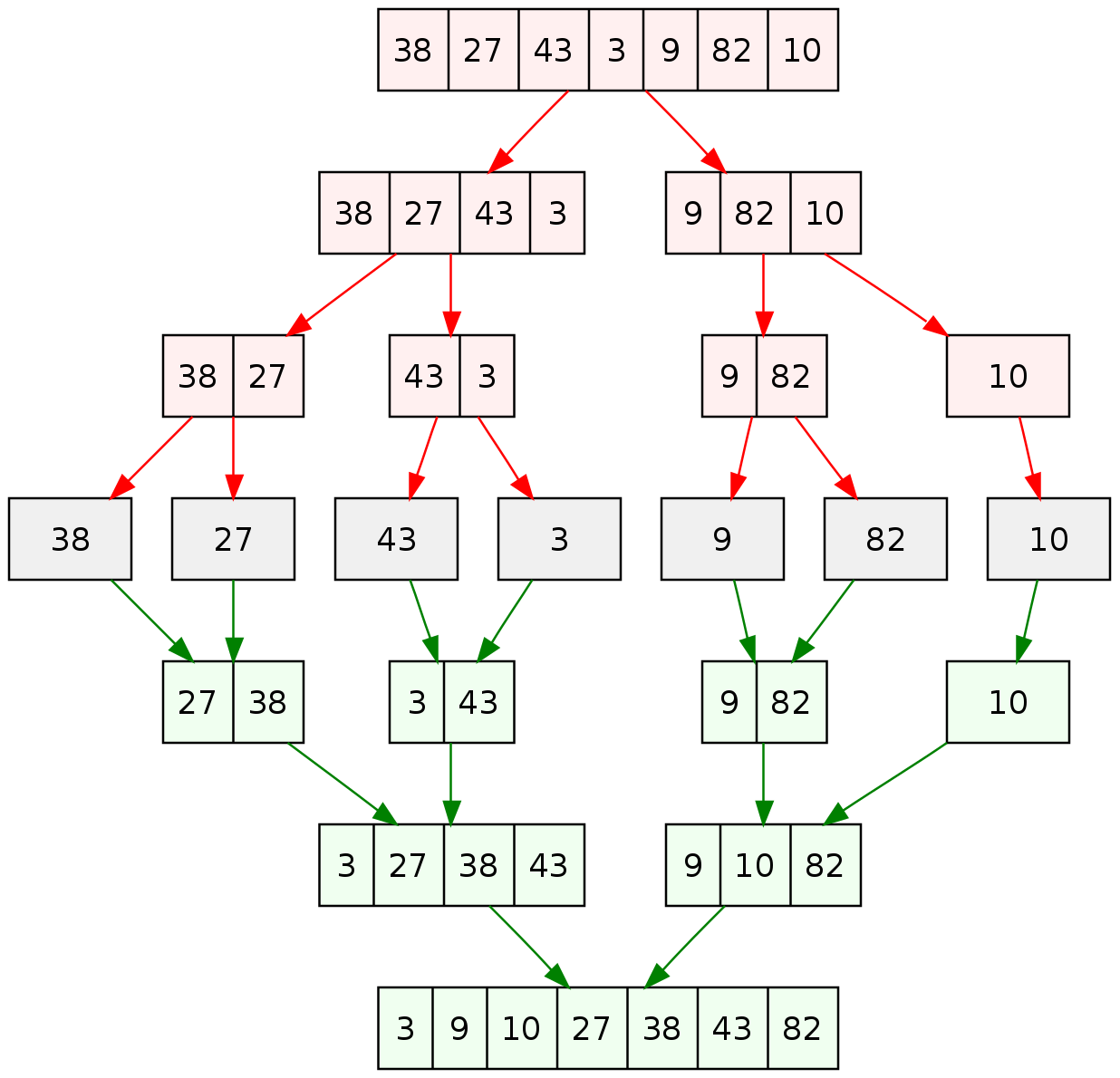Divide And Conquer Algorithem
Many algorithm are regression: for solving one problem, it call one or more times related function
to solve the small problems.
These algorithm are typically follow the Divide And Conquer Method:
Divide the original problem to several small related small problems. The solve these small problems regressively, and combine the result of these small problems.
Step
Divide And Conquer
Dividethe original problem to small problemsSolvethe small problems, these small problems are related to the original one but scale is smallCombinethe result of these small problems which will be the solution of the original problem
Merge Sort
Divide: divide array (length: n) into 2 sub-arrays (length: n/2)Solve: use merge sort recursively sort 2 sub-arraysCombine: combine 2 sorted sub-arrays to get the final array
Example

Pseudocode
Merge(A, p, q, r) <- O(r-p+1)
n1 = q - p + 1
n2 = r - q
let L[1..n1+1] and R[1..n2+1] be new arrays
for i = 1 to n1
L[i] = A[p + i - 1]
for j = 1 to n2
R[j] = A[q+j]
L[n1+1] = $\infty$ <- sentry
R[n2+1] = $\infty$ <- sentry
i = 1
j = 1
for k = p to r
if L[i] <= R[j]
A[k] = L[i]
i = i + 1
else A[k] = R[j]
j = j + 1
Merge-Sort(A, p, r)
if p < r
q = ⌊(p+r)/2⌋
Merge-Sort(A, p, q)
Merge-Sort(A, q+1, r)
Merge(A, p, q, r)
Swift Implement Merge Sort
- Top Down
func sortArray(_ nums: [Int]) -> [Int] {
if nums.count <= 1 { return nums }
let pivot = nums.count/2
let left = sortArray(Array(nums[0..<pivot]))
let right = sortArray(Array(nums[pivot..<nums.count]))
return merge(left, right)
}
// merge 2 sorted list
func merge(_ a1: [Int], _ a2: [Int]) -> [Int] {
var i = 0
var j = 0
var res = [Int]()
while i < a1.count, j < a2.count {
if a1[i] <= a2[j] {
res.append(a1[i])
i += 1
} else {
res.append(a2[j])
j += 1
}
}
while i < a1.count {
res.append(a1[i])
i += 1
}
while j < a2.count {
res.append(a2[j])
j += 1
}
return res
}
- Bottom Up
func sortArray(_ nums: [Int]) -> [Int] {
if nums.count <= 1 { return nums }
let n = nums.count
// cache[read] for reading
// cache[1-read] for writing
var cache = [nums, nums]
var read = 0 // either 0 or 1
var width = 1
while width < n {
var i = 0
while i < n {
var j = i
var l = i
var r = i + width
let lmax = min(l+width, n)
let rmax = min(r+width, n)
while l < lmax, r < rmax {
if cache[read][l] <= cache[read][r] {
cache[1-read][j] = cache[read][l]
l += 1
} else {
cache[1-read][j] = cache[read][r]
r += 1
}
j += 1
}
while l < lmax {
cache[1-read][j] = cache[read][l]
l += 1
j += 1
}
while r < rmax {
cache[1-read][j] = cache[read][r]
r += 1
j += 1
}
i += width * 2
}
// update width & read for new merge
width *= 2
read = 1 - read
}
return cache[read]
}
Time Complexity
The time complexity of Merge Sort is $O(nlog_{2}n)$.


Comments
Join the discussion for this article at here . Our comments is using Github Issues. All of posted comments will display at this page instantly.